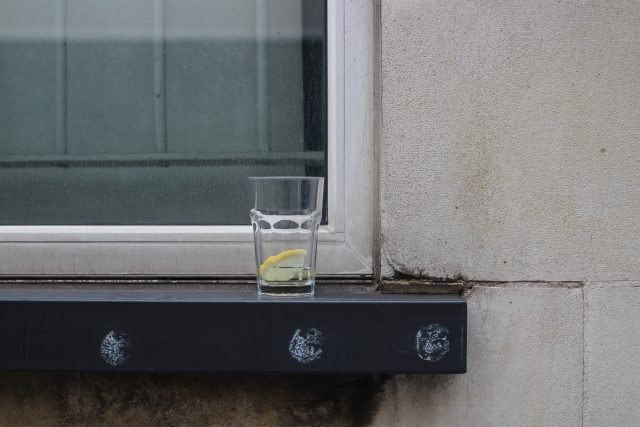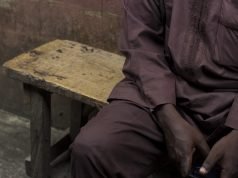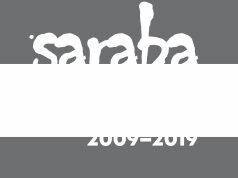I arrive in the city of Uyo for my Youth Service. The scarcity of traffic jams here compared to the car-choked roads in Lagos is not the only excitement I feel. The abundance of voluptuous women gives me further impression that this is a place for me, a place to unwind and, more importantly, a place for an aspiring writer to write in peace. However, one thing that I think I have left behind in Lagos and never expect to see here in Uyo—jostling for space by the roadside, tucked in-between street corners—is the often raucous Sport Bet House.
II
In the lodge where I live with several other corps members, weekends usually begin with a morning of football, then a hasty sanitation. Weekends are also the busiest days, offering many of these fellow corps members the panting excitements of expectation, of tinctures of hope and disappointment and more hoping. These emotions come mostly from information printed on the meticulously guarded rectangular pieces of papers that these folks are known to flaunt every weekend. These weekend papers are bet slips.
These bet slips contain sports games on which these folks have placed their bets. The more the games, the longer the slips. Some of these slips can even be as long as forty centimeters. In this gambled path to wealth, folks do not need university degrees to succeed. Their tumultuous knowledge of happenings in the football world is enough. And when such knowledge is lacking, the almighty Internet is at their disposal.
It seems an easy path but it mostly depends on one factor that holds back a friend of mine, Kunle. Each time folks place their bet, they show it to Kunle for final approval. But I have never seen him place a bet. He tells me once about his betting experience. It has begun in his penultimate year in the university. Then, Kunle has a friend, Tawe. They have been so close that he knows almost everything about Tawe. He knows so much that he is able to gather that Tawe’s then latest “keep the change” policy, newfound love for eating at pricey restaurants, and recent wardrobe change has been far above the monthly pocket money.
Tawe receives from his pensioner-parents. Kunle, not wanting to be financially left behind, has pleaded with Tawe to introduce him to this new business. Tawe responds by asking Kunle to lend him a thousand naira promising to repay with ten thousand naira the following week. It is a deal too tempting to refuse, and so Kunle succumbs and waits. The following week comes and Kunle is rewarded with ten one thousand naira notes. Then, Tawe tells him that the secret is betting. He has had some sure games and with just five thousand naira, Kunle can win a million naira, brags Tawe. Blinded by his own glee, Kunle pulls out six thousand naira. But this time in the following week, Tawe returns with a sullen face, “…just give me two thousand and you will get 20k. Sure game…”
“Till now I haven’t got my money back. That was when I learnt sure games don’t exist, because betting is a game of chance. It is based on one’s ability to predict the future, which no man knows. It is too risky for me,” Kunle remarks.
Later on, Tawe’s financial buoyancy, which Kunle has always envied, vanishes, and in chasing the mirage of sure games, Tawe ends up staking his final year school fees on a bet. That costs poor Tawe an extra year. Kunle’s convictions from his brief incursion into the betting business are remarkable. I reflect on the nature of betting and my relations to it. Our inability to predict the future can make all our life choices seem like a gamble. The amount of control we have in attaining our desired outcome determines the level of its certainty.
The value of what we tend to lose if the desired outcome is unattained determines its risk. Sport betting is based on this principle, and using money as a desired outcome makes it a perfect bait to blind one to its high level of uncertainty, if not absurdity. And when we consider that we actually do not have the powers to predict the future, at least for those of us without the supernatural powers of foresight, as some are believed to possess, then it means that we continuously live in a state of uncertainty, anxiety, a state of gambling. Our ambitions, dreams, risks, decisions, love; just everything is all a gamble.
And what explains the absurdity of a gambled life much better than the art of telling stories, writing about the troubles in one’s head and looking to such scribbles turning one into a famous name? While considering all of these troubling epiphanies, I think of converting the sound in my head into a story. If only I can execute it flawlessly, it will end my rejection-mail streak, yet another gamble.
III
Betting is the fastest form of investment I know. With as little as one hundred naira, you can be forty million naira richer in less than a week. I have seen those who place bets on about forty games over a span of one week, and after thirty-nine games have been successful, they wait patiently for the last game to come through. This brings me to the story of Timi.
Timi had a football-viewing centre somewhere on the outskirts of Lagos. We all liked Timi. If we had no money, he allowed us watch for free. His viewing centre was a rented room filled with ten benches on each side of columns that each faced an LCD television. It was an arena where men could be men. Whoop to the top of your voice when your team scored, protest against the referee when he made a call against your team, and hurl insults on those supporting the opposing side. Sometimes it led to fights but they were never personal, just an expression of our love for football.
The night in particular was a Tuesday Champions League night: Arsenal v. Anderlecht. At the 58th minute, Arsenal nailed their third goal. Shortly after, cans of Star beer were passed round. I asked the man beside me whether he knew who was paying for all the drinks. He pointed to Timi, the man on dreadlocks standing amidst the howling aisle and chanting.
“Timi go win twenty million this night.” The man beside me said.
“How?”
Then he told me of how Timi owed about seven months’ rent, the proprietor threatening to close down the centre if Timi did not pay by the month’s end. How Timi had borrowed five thousand naira to stake thirty games with twenty-nine already in his favour. A win by Arsenal would guarantee his millions, and Arsenal already had a three-goal lead. To thank God, he decided to get everyone a can of Star beer.
I uncorked my can of beer and took a refreshing gulp to Timi’s luck. At that moment, I wished I were Timi and regretted not being a gambler. Suddenly, a team scored. Offside or no offside. The referee had made his decision. 3 – 1. Timi paused in his joyous chant, but continued again after cursing the referee’s mother. About twelve minutes later, a penalty was awarded against Arsenal. Goal! 3 – 2. Timi stopped his chants.
90 minutes: 3 – 3. There was an unusual quiet in the atmosphere. A mournful gloom as if predicting an inevitable catastrophe. Four minutes into extra time. Timi sat close to the TV, muttering and crossing his chest continuously. Before the referee blew the final whistle, I took the last gulp of my Star beer and walked out. It was the last I saw of Timi. The next week, I would be in Kano for law school, after that, Youth Service.
Timi did not have ability to will his choices to their desired outcome. Like everything human, he too was a puppet to chance. And no matter how much he needed its help, chance remained indifferent. Simply put, chance could be a bitch. I have learnt that one way to reduce chance’s fun and guile is by being in a position of control. But how can one realise such a position? Can we ever gain control of situations, of our lives? Is there any outcome without this tinge of uncertainty? Then I think of granting Timi’s choice the gift of certainty, by making him the hero of my embryonic short story. He will place a risky bet and against all odds, he will win. The only way I can repay him for his loss and generosity.
IV
As corps members, we are paid a monthly stipend of nineteen thousand eight hundred naira—this is popularly known as allawee. After every allawee, eight hundred naira takes a one-way trip into betting for folks invested in playing chance. Thereafter, majority of the remaining sums go through similar one-way, chance trips. Two weeks later, everyone complains of red accounts, curses the bet houses for their losses, and makes resolutions never to bet again. Until the next allawee arrives and the same cycle repeats itself.
My roommate, Chike, is a chronic gambler. He goes as far as Azerbaijani League (Qarabag), Japanese J League 2 (Yamaguchi FC), and Saudi Arabian League (Al-Ahli). However, this season has been one of unpredictability. The rise of Leicester City, the fall of Chelsea, the occasional Barcelona disappointments, etc. Every weekend, he litters the room with shattered dreams in the form of failed bet slips. For every loss he faces, he announces it with a loud wail.
“My bet don cast again.” He says one night, after Barcelona’s loss to Real Sociedad. This season, Barcelona is arguably the strongest team in the world and Real Sociedad will need ladders to stand shoulder-to-shoulder with them. Therefore, putting Barcelona to win is the safest bet. But this time around, it is not.
“If I know, I for no pick am.” He laments. This is Chike’s usual mantra each time he loses a bet. If people know their choices are the wrong ones, of course, they will not make them. To then say that have we known, we will have made better choices after realizing the disappointments that come with our choices seems downright silly. Evidently, we do not know and perhaps cannot have ever known the outcome of our choices before we make them. Like all things, including knowledge itself, we reason them backwards, after we have seen the outcome of the past, after chance has played its tricks.
Instead of telling Chike my thoughts, I ask why he still places bets in spite of these heartbreaks.
“What I am doing is investment. The way the economy looks is good rea- son to invest in this way. Today, I may be poor, but tomorrow, literally, I can be a millionaire. One day, one day, I will make it big,” he retorts dreamily. Each month, after exhausting his allawee gambling, he turns to me for “small change” he borrows. Half of the time, he never pays back. One day, after seeing the frown on my face as
I grudgingly lend him money, he tells me of his dreams to pursue his masters. That is before he loses his father, shortly before the Service year. He has suddenly realised that his civil servant mother would not be able to bear the financial burdens of a master’s degree. Moreover, he has three younger ones still in school.
“That’s why I have to take charge of my future,” he says. “And you know I’m the first male child. Everybody will start looking up to me for money. What work can I do that will give me that kind of money in this Service year? Is this gambling not better than stealing?” I want to ask him in response if it makes more sense to lose hold of the present in pursuing an uncertain future. But he is already leaving with my money, off to the nearest bet house.
“No worry! If I win, I no go forget you.” He shouts from outside as he runs off.
V
Niyi on the other hand is notorious for staking as little as three hundred naira for as much as one hundred and twenty million naira. He loses every time. He says the National Youth Service Corps programme is a waste of time and betting is the only thing that can give him the sort of thrill his uneventful life has needed. He also says, even though he places bets, betting is a sign of irresponsibility, and that is why he will quit betting after the national service. However, after hearing that someone has won about ninety million naira with just eight hundred naira, Niyi revises his mantra about betting: “It is only a sign of irresponsibility if you make it your sole focus and lose more than you win.”
Each time they stake their bets, folks will gather to discuss how the money will be spent. The general wishes are usually thus: taking everybody in the lodge to Le Meridian Hotel and Golf Resort, buying a Range Rover, drinking to stupor, pursuing masters’ degrees abroad, building houses for their parents, shutting down nightclubs, etc. Sometimes, arguments will arise on the folly or otherwise of another’s plans.
One particular evening, while plans are laid down on how to spend millions of hope in unrealised cash, I get another rejection mail. After the ritual of thinking I am a horrible writer faded, I start polishing a draft I have written on Timi’s gambling, readying it for yet an- other submission. Then I pause. I finally understand why people like Chike keep on betting, irrespective of their losses. It is the same reason I keep writing despite the showers of rejection mails. It is because of the hope we have, a large amount of hope that loss will exhaust itself trying to consume. If one person can succeed, it means we can. Why give up now and regret it later? It comes as an epiphany. It is not the desire for money, to be wealthy and comfortable. Money is of course a part of it. But I realize though that hope is a currency in itself.
It is the currency chance makes her own bets on. As much as chance plays us, so too we play chance. By hoping and repeating ourselves. With this in mind, I send my Timi draft to a call for manuscript submission, shut my laptop, and join other folks riding on the wings of their wish- ful dreams. At this point, I feel that only one thought unites us all, the hope that this time around the odds will be in our favour.
(c) Immaculata Abba, Shoreditch, June 2017
































